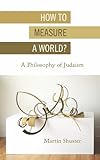How to measure a world? : a philosophy of Judaism / Martin Shuster.
Material type: TextSeries: New Jewish philosophy and thoughtPublisher: Bloomington, Indiana : Indiana University Press, [2021]Description: 1 online resource (xii, 241 pages)Content type:
TextSeries: New Jewish philosophy and thoughtPublisher: Bloomington, Indiana : Indiana University Press, [2021]Description: 1 online resource (xii, 241 pages)Content type: - 0253054559
- 9780253054555
- 9780253054579
- 0253054575
- 181/.06 23
- BM565 .S463 2021
- online - EBSCO
| Item type | Current library | Call number | URL | Status | Notes | Barcode | |
|---|---|---|---|---|---|---|---|
 eBook
eBook
|
Biblioteca "Angelicum" Pont. Univ. S.Tommaso d'Aquino Nuvola online | online - EBSCO (Browse shelf(Opens below)) | Online access | Not for loan (Accesso limitato) | Accesso per gli utenti autorizzati / Access for authorized users | (ebsco)2708170 |
Includes bibliographical references and index.
I. Having a world -- 1. Wonder and world: Maimonides's phenomenology -- 2. Suffering and world: Adorno's negativity -- II. Preconditions of having a world -- 3. History and world: Benjamin and Adorno on ethical depth -- 4. Language and world: Levinas and Cavell on ethical foundations.
"What does it mean to wonder in awe or terror about the world? How do you philosophically understand Judaism? In How to Measure a World?: A Philosophy of Judaism, Martin Shuster provides answers to these questions and more. Emmanuel Levinas suggested that Judaism is best understood as an anachronism. Shuster attempts to make sense of this claim by alternatively considering questions of the inscrutability of ultimate reality, of the pain and commonness of human suffering, and of the ways in which Judaism is entangled with the world. Drawing on phenomenology and Jewish thought, Shuster offers novel readings of some of the classic figures of Jewish philosophy while inserting other voices into the tradition, from Moses Maimonides to Theodor W. Adorno to Walter Benjamin to Stanley Cavell. How to Measure a World? examines elements of the Jewish philosophical record to get at the full intellectual scope and range of Levinas's proposal. Shuster's view of anachronism thereby provokes an assessment of the world and our place in it. A particular understanding of Jewish philosophy emerges, not only through the traditions it encompasses, but also through an understanding of the relationship between humans and their world. In the end, Levinas's suggestion is examined theoretically as much as practically, revealing what's at stake for Judaism as much as for the world"-- Provided by publisher
Online resource; title from digital title page (viewed on March 01, 2021).


